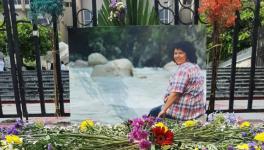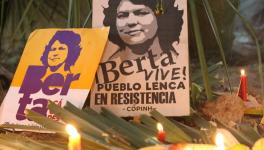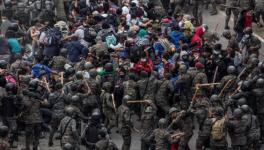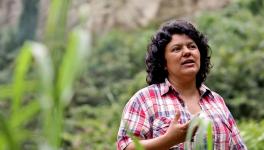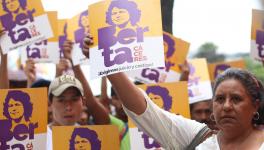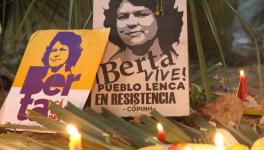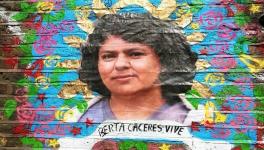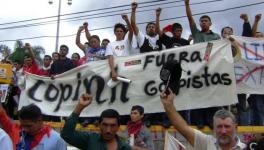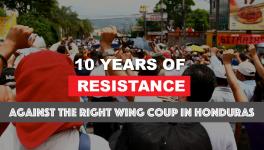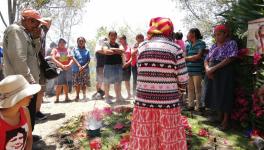What is Happening With the Berta Cáceres Case?
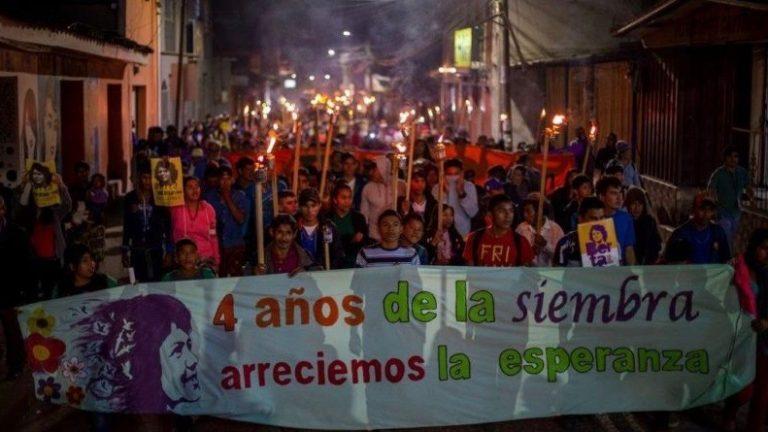
In March 2021, 5 years will have passed since the assassination of Indigenous leader Berta Cáceres in Honduras.
56 months have passed since the assassination of Honduran Indigenous revolutionary Berta Cáceres. To this day, those who planned the murder of the leader of the Lenca community are yet to be punished. Her organization, the Civic Council of Popular and Indigenous Organizations of Honduras (COPINH), and its allies have consistently waged a struggle for justice and for those behind the conspiracy to be punished. The legal process has been beset by delays, and the COVID-19 pandemic has only worsened the situation.
In the coming months, proceedings in two of the 13 cases in the legal process around the assassination of Berta Cáceres will reveal more about this conspiracy. One of them is the trial of David Castillo for his role in the assassination. The second is the Gualcarque fraud case, which probes the nexus between public functionaries and those involved in the Agua Zarca hydroelectric project, including Castillo the notorious Atala Zablah family. This influential family is also believed to be involved in the assassination.
Berta Cáceres and COPINH had been in the forefront of the struggle against the Agua Zarca hydroelectric project whose main promoter was the Desarrollos Energéticos S.A. (DESA) company. The concession for the project had been given without the free and informed consent of the community in the Rio Blanco region. The resistance to this project led to a violent campaign against her by security forces of the Honduran state, the private security of the DESA and hired security contractors, culminating in her assassination on March 2, 2016. In November 2018, seven “material authors” were convicted of the assassination. These were the hitmen hired for the crime. At that point, COPINH had said that justice must involve the trial and conviction of all those involved in “the plot of persecution, harassment and threats that brought about the assassination of Berta Cáceres.”
It is here that the case against Castillo is crucial. David Castillo is the president of the Administrative Council and Legal Representative of DESA. He is accused of having orchestrated the surveillance of Berta, the planning of the assassination, and the coordination between the most important shareholders of the company and the group of hitmen. A former lieutenant of military intelligence in the Honduran army, Castillo was trained in the US military school, West Point. According to the general coordinator of COPINH and the daughter of Cáceres, Bertha Zúniga, “Castillo is the most high-profile person to be arrested till now. He has very important links with majority shareholders of the company that are from the oligarchic Atala Zablah family that enjoys complete impunity.”
Castillo was arrested while trying to flee the country on March 2, 2018. Only six months remain for the trial to be held as his preventive detention ends on May 25, 2021. Despite the abundance of evidence, the trial has run into many obstacles. Castillo’s defense team has filed appeal after appeal. On October 22, after seven suspensions, a preparatory hearing was held in the case and yet again, the defense team presented more appeals. According to COPINH, a two-pronged strategy is at play here “One is to stretch the proceedings till Castillo’s preventive detention ends and then push for his release. But also we see it as a malicious action that seeks to deter the process seeking justice, and to continue covering up the actions that link him to this crime and cover up the links with the higher-ups who were part of it.”
Significantly, COPINH has been excluded from the trial process and the judge has refused to allow the proceedings to be broadcast publicly. During the trial of the hitmen too, both Berta’s family and the legal team of COPINH had been excluded. For COPINH, the speedy conclusion of the trial is essential to ensure justice for Berta Cáceres.
Castillo is also an important part of the Gualcarque Fraud Case which is named after the river on which the Aqua Zarga project was commissioned. The project was one of the 51 in Lenca territory that COPINH had denounced. According to the organization, the concessions or contracts for many of these projects were given after the 2009 coup and involved a great amount of corruption.
In March 2019, the Mission of Support against Corruption and Impunity in Honduras and the Special Prosecution Unit Against Corruption and Impunity summoned 16 public functionaries in the Gualcarque Fraud Case case. The charges against them included fraud, abuse of authority and “acts committed with the objective of favoring the Atala Zablah family through contracts with the Honduran state and the DESA company,” according to COPINH.
Both Castillo and the Atala Zablah family are heavily implicated in this case. According to the investigation in the case, DESA, which was given the concession for the project, was formed by two “front men” who were employed in another company of Castillo. He attended meetings in 2009 where the “contracts were given to DESA for the production of electricity” and after this, Castillo became an official member of the board of directors of the company along with the Atala Zablah family.
Research done into the case has revealed that Castillo and the Atala Zablah family built up a criminal network in order to execute the project. This was used to commit a series of crimes and human rights violations against the community in the Rio Blanco region. Six activists were assassinated, including Berta Cáceres.
COPINH had participated in the initial stage of the process as a victim but was excluded in August 2019 after an appeal was presented by the defense of the functionaries (similar to what happened in the trial of the hitmen from the assassination wherein the legal team of COPINH and Berta’s family were also excluded). After this decision, the legal team of COPINH had attempted to present several legal appeals seeking the participation of the victims, the Río Blanco community and the organization they are a part of. However, the legal process advanced without their participation.
According to Bertha Zúniga, the exclusion of COPINH and of the Río Blanco community from the Gualcarque Fraud case demonstrates that the justice system was not created to respond to remedy the damage caused to the victims but merely serves to whitewash the results of the quest for justice for Berta Cáceres. She said that powerful interests are at work to ensure that the COPINH does not participate as they are worried about the information it can bring forward, information it has gathered in its fight against the justice system with the only weapon it has – the truth about the crime.
For Bertha Zúniga, the fight is not only about the assassination but also about “the illegal imposition of the projects that have affected territorial rights, the dignity of the Lenca people that has unleashed different levels of violence even reaching assassination.” It is here that the exclusion of the Indigenous people from the process is all the more significant.
The trial in this case has been set for January 18, 2021. For COPINH, if the case moves forward without the participation of the victims, it will be a “flagrant violation to the right of justice.”
Get the latest reports & analysis with people's perspective on Protests, movements & deep analytical videos, discussions of the current affairs in your Telegram app. Subscribe to NewsClick's Telegram channel & get Real-Time updates on stories, as they get published on our website.









